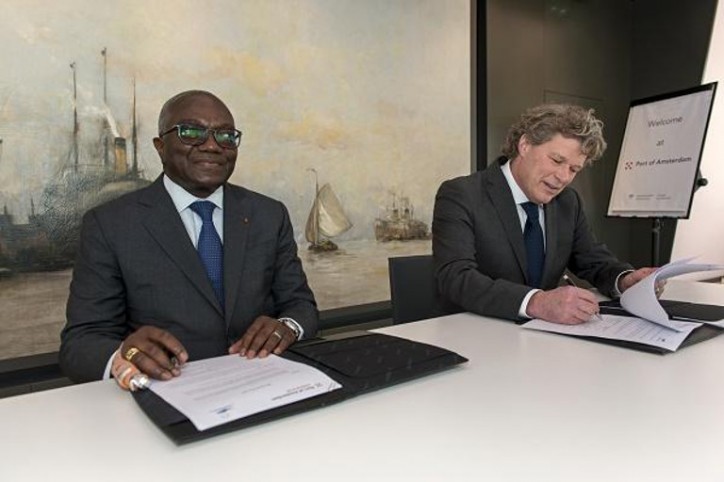Port of Amsterdam International, a 100% subsidiary of Port of Amsterdam, and Port Autonome de San Pedro (Côte d’Ivoire) are going to exchange knowledge and stimulate trade between both ports. The focus for trade will lay on the shipment of cocoa. This has been agreed to by both ports. Côte d’Ivoire is the biggest producer of cocoa worldwide and San Pedro is the most prominent export port of cocoa. The port of Amsterdam is the biggest import port of cocoa.

These positions mean that the port of San Pedro and Amsterdam are closely intertwined. The ports share customers, both have to adapt to the same developments in the global cocoa industry, and both want to contribute to making the logistical chain more sustainable. The agreement was preceded by an earlier Memorandum of Understanding (MoU) signed between Port of Amsterdam International (PoAI) and Port Autonome de San Pedro (PASP). The previous MoU forms the foundation for the partnership between the ports and aimed at a number of subjects for close collaboration, including sustainable development and port logistics.
In the intervening period, PoAI and PASP have jointly worked on the implementation of the stipulations of the MoU, in collaboration with the Dutch government. For example, PoAI performed an assessment of the logistical cocoa chain in Côte d’Ivoire, together with the Dutch development bank FMO and commissioned by the Embassy of the Kingdom of the Netherlands in Abidjan. Based on the outcomes, the partnership between PoAI and PASP will now be expanded, with subjects like nautical management and port policy. The experience and expertise of Port of Amsterdam in these fields can be of assistance to the PASP. As a first step, PoAI will, commissioned by the Netherlands Enterprise Agency, conduct an assessment of the operations and logistics in the port of San Pedro. In this way a contribution is made to making the activities in the Ivorian port more efficient, more effective and more sustainable. The setting up of sustainable initiatives will also be examined.
The partnership with the PASP underlines the importance Port of Amsterdam attaches to international relations.
As Koen Overtoom, CEO of Port of Amsterdam, indicated, ‘Cocoa has a long history in the port of Amsterdam. Large warehousing companies are established here and the processing industry is located in the Zaanstreek. We aim to maintain our position in the global chain. The collaboration with the biggest export port in the world is therefore very important, because it will not only allow us to stimulate trade, but also to contribute to the sustainable development of the cocoa chain.’ This sentiment was echoed by Hilaire Marcel Lamizana, the Managing Director of PASP, ‘The port of San Pedro has achieved very large growth in the handling of cocoa over the last couple of years. We see partnerships such as the one with Port of Amsterdam as very valuable to facilitate further growth and to improve the cocoa chain in a sustainable matter.’
Source: Port of Amsterdam